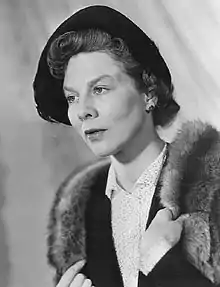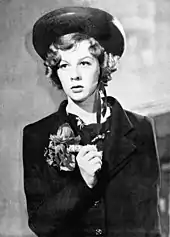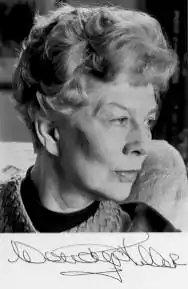Wendy Hiller
Dame Wendy Margaret Hiller, DBE (15 August 1912 – 14 May 2003) was an English film and stage actress who enjoyed a varied acting career that spanned nearly 60 years. Writer Joel Hirschorn, in his 1984 compilation Rating the Movie Stars, described her as "a no-nonsense actress who literally took command of the screen whenever she appeared on film". Despite many notable film performances, Hiller chose to remain primarily a stage actress.
Wendy Hiller | |
|---|---|
 Hiller in Sailor of the King (1953) | |
| Born | Wendy Margaret Hiller 15 August 1912 |
| Died | 14 May 2003 (aged 90) Beaconsfield, Buckinghamshire, England |
| Resting place | St Mary Churchyard, Radnage, Buckinghamshire, England |
| Occupation | Actress |
| Years active | 1935–1993 |
| Spouse | |
Hiller won the Academy Award for Best Supporting Actress for her performance in Separate Tables (1958).[1] Her performance as Eliza Doolittle in Pygmalion (1938) earned a nomination for the Academy Award for Best Actress.
Early life
Born in Bramhall, Cheshire, the daughter of Frank Watkin Hiller, a Manchester cotton manufacturer, and Marie Stone, she was educated at Winceby House School and at age 18 joined the Manchester Repertory Company, for which she acted and stage-managed for several years.[2] She first found success as slum dweller Sally Hardcastle in the stage version of Love on the Dole in 1934. The play was an enormous success and toured the regional stages of Britain, including Hiller's West End debut in 1935 at the Garrick Theatre. In 1937, she married the play's author Ronald Gow, 15 years her senior. That same year, she made her film debut in Lancashire Luck, scripted by Gow.
Career
Stage
The huge popularity of Love on the Dole took the production to New York in 1936, where Hiller's performance attracted the attention of George Bernard Shaw. Shaw recognised a spirited radiance in the young actress, which was ideally suited for playing his heroines. Shaw cast her in several of his plays, including Saint Joan, Pygmalion and Major Barbara, and his influence on her early career is clearly apparent. She was reputed to be Shaw's favourite actress of the time. Unlike other stage actresses of her generation, she performed in relatively few Shakespeare productions, preferring the more modern dramatists such as Henrik Ibsen and new plays adapted from the novels of Henry James and Thomas Hardy, among others.
In the course of her stage career, Hiller won popular and critical acclaim in both London and New York. She excelled at rather plain but strong-willed characters. After touring Britain as Viola in Twelfth Night (1943), she returned to the West End to be directed by John Gielgud as Sister Joanna in The Cradle Song (Apollo, 1944). The string of notable successes continued as Princess Charlotte in The First Gentleman (Savoy, 1945) opposite Robert Morley as the Prince Regent, Pegeen in Playboy of the Western World (Bristol Old Vic, 1946) and Tess of the d'Urbervilles (Bristol Old Vic, 1946, transferring to the Piccadilly Theatre in the West End in 1947), which was adapted for the stage by her husband.
In 1947, Hiller originated the role of Catherine Sloper, the painfully shy, vulnerable spinster in The Heiress on Broadway. The play, based on the Henry James novel Washington Square, also featured Basil Rathbone as her emotionally abusive father. The production enjoyed a year-long run at the Biltmore Theatre in New York and would prove to be her greatest triumph on Broadway. On returning to London, Hiller again played the role in the West End production in 1950.
Her stage work remained a priority and continued with Ann Veronica (Piccadilly, 1949), which was adapted by Gow from the novel by H. G. Wells[3] with his wife in the leading role. She performed in a two-year run of N. C. Hunter's Waters of the Moon (Haymarket, 1951–53) alongside Sybil Thorndike and Edith Evans. At the Old Vic for the 1955–56 season, Hiller contributed a notable performance as Portia in Julius Caesar, among others, including as Helen of Troy in Troilus and Cressida. Other stage work at this time included The Night of the Ball (New Theatre, 1955), the new Robert Bolt play Flowering Cherry (Haymarket, 1958, Broadway, 1959), Toys in the Attic (Piccadilly, 1960), The Wings of the Dove (Lyric, 1963), A Measure of Cruelty (Birmingham Repertory, 1965), A Present for the Past (Edinburgh, 1966), The Sacred Flame (Duke of York's, 1967) with Gladys Cooper, The Battle of Shrivings (Lyric, 1970) with John Gielgud and Lies (Albery, 1975).
In 1957, Hiller returned to New York to star as Josie Hogan in Eugene O'Neill's A Moon for the Misbegotten, a performance that gained her a Tony Award nomination as Best Dramatic Actress. The production also featured Cyril Cusack and Franchot Tone. Her final appearance on Broadway was as Miss Tina in the 1962 production of Michael Redgrave's adaptation of The Aspern Papers from the Henry James novella.
As Hiller matured, she demonstrated a strong affinity for the plays of Henrik Ibsen, as Irene in When We Dead Awaken (Cambridge, 1968), as Mrs. Alving in Ghosts (Edinburgh, 1972), Ase in Peer Gynt (BBC, 1972) and as Gunhild in John Gabriel Borkman (National Theatre Company, Old Vic, 1975), in which she appeared with Ralph Richardson and Peggy Ashcroft. Later West End successes such as Queen Mary in Crown Matrimonial (Haymarket, 1972) proved that she was not limited to playing dejected, emotionally deprived women. She later revisited some earlier plays playing older characters, as in West End revivals of Waters of the Moon (Chichester, 1977, Haymarket, 1978) with Ingrid Bergman and The Aspern Papers (Haymarket, 1984) with Vanessa Redgrave. She was scheduled to return to the American stage in a 1982 revival of Anastasia with Natalie Wood, but Wood died just weeks before rehearsals. Hiller made her final West End performance in the title role in Driving Miss Daisy (Apollo, 1988).
Film

At Shaw's insistence, she starred as Eliza Doolittle in the film Pygmalion (1938) with Leslie Howard as Professor Higgins. This performance earned Hiller her first Oscar nomination, a first for a British actress in a British film, and became one of her best-remembered roles. She was also the first actress to utter the word "bloody" in a British film, when Eliza utters the line "Not bloody likely, I'm going in a taxi!"
Hiller followed up this success with another Shaw adaptation, Major Barbara (1941) with Rex Harrison and Robert Morley. Powell and Pressburger signed her for The Life and Death of Colonel Blimp (1943), but her second pregnancy forced her to bow out in favor of Deborah Kerr. Determined to work with Hiller, the filmmakers later cast her with Roger Livesey again for I Know Where I'm Going! (1945), another classic of British cinema.

Despite her early film success and offers from Hollywood, she returned to the stage full-time after 1945 and only occasionally accepted film roles. With her return to film in the 1950s, she portrayed an abused colonial wife in Carol Reed's Outcast of the Islands (1952), but had already transitioned into mature, supporting roles with Sailor of the King (1953) and as a memorable victim of the Mau Mau uprising in Something of Value (1957). She won the Oscar for Best Supporting Actress in 1959 for the film Separate Tables (1958) as a lonely hotel manager and mistress of Burt Lancaster. She remained uncompromising in her indifference to film stardom, as evidenced by her surprising reaction to her Oscar win: "Never mind the honour, cold hard cash is what it means to me."[4] She received a BAFTA nomination as Best Supporting Actress for her portrayal of the domineering, possessive mother in Sons and Lovers (1960).[5] She reprised her London stage role in the Southern Gothic Toys in the Attic (1963), which earned her a Golden Globe nomination as the elder spinster sister in a film that also stars Dean Martin and Geraldine Page.[6]
Hiller received a third Oscar nomination for her performance as the simple, unrefined but dignified Lady Alice More, opposite Paul Scofield as Thomas More, in A Man for All Seasons (1966). Her role as the grand Russian princess in a great commercial success, Murder on the Orient Express (1974), won her international acclaim and the Evening Standard British Film Award as Best Actress. Other notable roles included a Jewish refugee fleeing Nazi Germany with her dying husband in Voyage of the Damned (1976), the formidable London Hospital matron in The Elephant Man (1980) and Maggie Smith's emotionally cold and demanding aunt in The Lonely Passion of Judith Hearne (1987).
Television
Hiller made numerous television appearances, in both Britain and the United States. In the 1950s and 1960s, she performed in episodes of American drama series such as Studio One and Alfred Hitchcock Presents among others. In 1965, she starred in an episode of the acclaimed dramatic series Profiles in Courage (1965), in which she played Anne Hutchinson, a free-thinking woman charged with heresy in Colonial America. In Britain during the 1960s, Hiller gained critical acclaim for a guest appearance in a 1964 episode of the police drama Z-Cars,[7] appeared in the drama series Play of the Month, and in 1965 was the narrator for five episodes of the BBC children's television programme Jackanory, reading the stories of Alison Uttley.
Throughout the 1970s and 1980s, she appeared in many television films including a memorable Duchess of York in the BBC Television Shakespeare production of Richard II (1978), the irascible Edwardian Oxford academic in Miss Morrison's Ghosts (1981) and the BBC dramatisations of Julian Gloag's Only Yesterday (1986) and the Vita Sackville-West novel All Passion Spent (1986), in which she was the quietly defiant Lady Slane. This performance earned her a BAFTA nomination as Best Actress. Her last appearance, before retiring from acting, was the title role in The Countess Alice (1992), a BBC/WGBH-Boston television film with Zoë Wanamaker.
Personal life

In the early 1940s, Hiller and husband Ronald Gow moved to Beaconsfield, Buckinghamshire, where they brought up two children, Ann (1939–2006) and Anthony (b. 1942), and lived together in the house called "Spindles" (now demolished). Ronald Gow died in 1993, but Hiller continued living at their home until her death a decade later. When not performing on stage or screen, she lived a completely private domestic life, insisting on being referred to as Mrs. Gow rather than by her stage name.
Regarded as one of Britain's great dramatic talents, she was made an Officer of the Order of the British Empire (OBE) in 1971 and raised to Dame Commander (DBE) in 1975.
In 1984 she was awarded an honorary doctorate from the University of Manchester. In 1996, Hiller was honoured by the London Film Critics Circle with the Dilys Powell Award for excellence in British film. Her style was disciplined and unpretentious, and she disliked personal publicity. The writer Sheridan Morley described Hiller as being remarkable in her "extreme untheatricality until the house lights went down, whereupon she would deliver a performance of breathtaking reality and expertise."[8]
Despite a busy professional career, throughout her life she continually took an active interest in aspiring young actors by supporting local amateur drama societies,[9] as well as being the president of the Chiltern Shakespeare Company until her death. Chronic ill health necessitated her eventual retirement from acting in 1992. She spent the last decade of her life in quiet retirement at her home in Beaconsfield, where she died of natural causes at the age of 90.[10]
Filmography
Film
Television
| Year | Title | Role | Notes |
|---|---|---|---|
| 1959 | Graduating Class | Laura Siddons | Season 5 Episode 14 of Alfred Hitchcock Presents, released Dec 27, 1959 |
| 1969 | David Copperfield | Mrs. Micawber | |
| 1969 | The Growing Summer | Aunt Dymphna | Silver medal at 1969 Venice Film Festival |
| 1972 | Clochemerle | Justine Putet | |
| 1978 | Richard II | Duchess of York | |
| 1979 | Edward the Conqueror | Louisa | episode of Tales of the Unexpected |
| 1980 | The Curse of King Tut's Tomb | Princess Vilma | |
| 1981 | Country | Lady Carlion | episode of Play for Today |
| 1982 | The Kingfisher | Evelyn | |
| 1982 | Witness for the Prosecution | Janet Mackenzie | |
| 1985 | The Importance of Being Earnest | Lady Bracknell | |
| 1985 | The Death of the Heart | Matchett | from the novel by Elizabeth Bowen |
| 1986 | Lord Mountbatten: The Last Viceroy | Princess Victoria | as Dame Wendy Hiller |
| 1986 | Only Yesterday | May Darley | from the novel by Julian Gloag |
| 1986 | All Passion Spent | Lady Slane | Nominated – British Academy Television Award for Best Actress |
| 1987 | Anne of Avonlea | Mrs. Harris | as Dame Wendy Hiller |
| 1988 | A Taste for Death | Lady Ursula Berowne | from the novel by P.D. James |
| 1989 | Ending Up | Adela | from the novel by Kingsley Amis |
| 1991 | The Best of Friends | Laurentia McLachlan | as Dame Wendy Hiller |
Awards and nominations
Academy Awards
| Year | Category | Work | Result | Winner |
|---|---|---|---|---|
| 1967 | Best Supporting Actress | A Man for all Seasons | Nominated | Sandy Dennis (Who's Afraid of Virginia Woolf?) |
| 1959 | Separate Tables | Won | — | |
| 1939 | Best Actress | Pygmalion | Nominated | Bette Davis (Jezebel) |
References
- "Awards for Separate Tables". Turner Classic Movies.
- "Hiller, Dame Wendy Margaret (1912–2003)". Oxford Dictionary of National Biography (online ed.). Oxford University Press. doi:10.1093/ref:odnb/89982. (Subscription or UK public library membership required.)
- "Ronald Gow (1897–1993)", doollee.com Gow is also co-credited with the book for the 1969 musical.
- "That Honor, That Cash". Time. 20 April 1959. Archived from the original on 16 February 2008.
- "BAFTA Awards". BAFTA.
- "Wendy Hiller". Golden Globes.com.
- Webber, Jim (21 November 1964). "Brian Blessed and Wendy Hiller Can Take Top Marks". Bristol Evening Post. Bristol, UK. Retrieved 28 January 2023 – via British Newspaper Archive.
All praise to Wendy Hiller for a memorable performance that would have done credit to a stage production, let alone a television 'once only' presentation. How well it demonstrated Miss Hiller's long dramatic experience, both on the stage and in the film studio. Her talent was exploited the full in this episode of Z Cars
- "Dame Wendy Hiller". The Daily Telegraph. London. 16 May 2003. Archived from the original on 12 January 2022.
- "The Young Theatre Archive: The Patrons of The Young Theatre". Archived 28 September 2007 at the Wayback Machine The Young Theatre Archive.
- "Wendy Hiller Spirited Actress, Dies at 90". The New York Times. 17 May 2003.